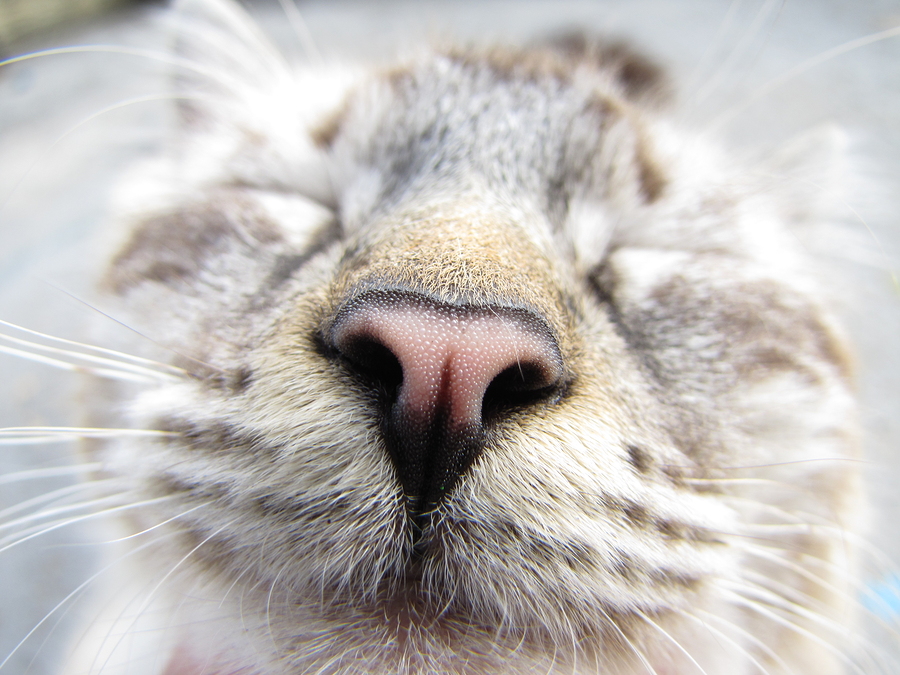The way our cats experience the world is different from the way we experience it, because their senses are tuned differently. We know a lot about feline senses, but all that knowledge gives only tantalizing clues to how they perceive their world. We can’t know what it feels like to be a cat.
Still, these clues are important in understanding feline behavior. I return to studying feline senses again and again, gaining new insights to their behavior every time.
To start with, cats live in smell world. Their sense of smell is far better than ours and may be as keen as that of dogs. We don’t rely heavily on our sense of smell, but it’s so important to cats that the sense is there at birth. Cats investigate novel places and objects by sniffing them and communicate with each other through scent.
When cats can’t smell (when they’re sick, for instance), they don’t eat, they change their litter box habits, and unneutered cats don’t engage in mating behaviors.
Ooh, That Smell
What seem like mild scents to us may have a pronounced odor to cats, one reason why they find the kitchen irresistible. We’re constantly slicing and cooking things like oranges and onions and olives, and cats want to investigate those scents. We may think our cats want to eat our food, but often they just want to smell it. In fact, giving your cat interesting new things to smell is a form of enrichment that may be as interesting as a new toy.
Cats have scent glands on their lips, chin, forehead, front paw pads, and along and under the tail. Every time they rub their cheeks or flanks or paws on something, they’re depositing pheromones—chemical signals that only other cats can detect. Pheromones produced by the glands at the front of the body are calming and inclusive, while those that come from the rear are generally used to declare territory or express stress.
Scent of a Cat
Everything in your home, including you, is marked with your cat’s scent. Cats like it when everything in the house smells the same, which is why they rub against anything new you bring home. And, since you insist on showering and washing your clothes, you cat has to mark you again and again. The pheromones they deposit say, “Now this belongs here.”
Marking the house and each other helps cats in a multicat home create a communal smell. When a new cat comes in, her unfamiliar odor changes the communal scent, and resident cats must begin a round of scent marking. But even in a single-cat home, cleaning products, perfumes, scented lotions and shampoos, and anything else with a strong odor may disturb that communal smell—and make your cat feel like she needs to cover the foreign odor by face marking, scratching, urinating, or spraying to restore olfactory order.
That Old Familiar Smell
Cats don’t really know each other (or us) by sight; it’s more scent and sound. So unfamiliar smells—for instance, if you put on new body lotion—can trick a cat into thinking she doesn’t know you. That can also happen among a group of cats if one goes to the veterinarian and comes back smelling unfamiliar.
Cats may also mingle their scent with yours to comfort themselves when they’re stressed. That’s cute when they sleep on your sweater but not so cute when they pee on it. It’s important to remember, though, scent marking is a way cats make something more familiar.
Smell and Taste
Taste is intricately tied to the sense of smell in both humans and cats. Taste is probably the only sense where we have the advantage over cats. Humans have about 9,000 taste buds, while cats have only about 470. What can cats taste? It’s limited. Those taste buds can distinguish between sour, salty, and bitter flavors.
Cats lack the genes that would enable them to develop taste buds to detect sweet flavors, because the amino acids in meat contain very few simple sugars. Nobody is sure if cats evolved without the sweet gene and then became carnivores, or if they were carnivores who eventually lost their sweet gene. That’s one of those chicken-and-egg questions—and cats are not talking about it.
The sense of taste mainly serves to ensure that cats don’t eat something rotten that will kill them, which is why a cat’s senses of smell and taste are closely linked. (Both register in the same area of the feline brain.)
Cats need to smell what they eat, which is why many of them won’t eat canned cat food straight out of the refrigerator. And they need to like what they smell, which is why many will not eat food that has been sitting out for a long time. Their wild ancestors ate meat that was still warm, and they could smell the delicate fragrance of a freshly killed mouse.
This article was reviewed/edited by board-certified veterinary behaviorist Dr. Kenneth Martin and/or veterinary technician specialist in behavior Debbie Martin, LVT.








